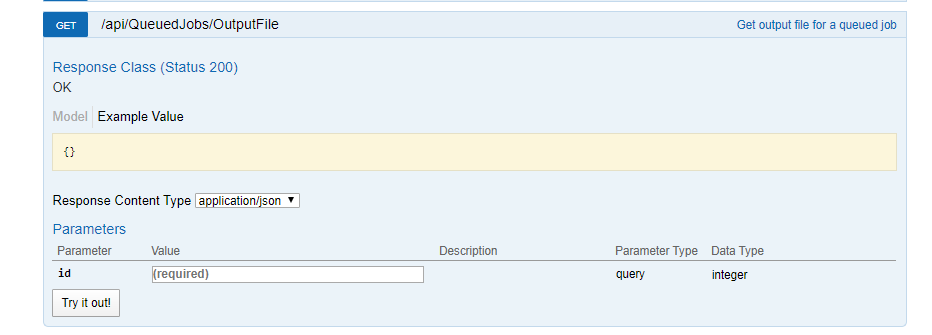Overview
In order to get information for output file of a single queued job, you can consume the endpoint presented in this article. In order to consume it, you must:
- Be authenticated user
For information on how you can authenticate, see: Authentication
As soon as you do authentication and receive a valid token, it needs to be passed on the call for receiving a single queued job information.
- Have valid ID of an existing queued job
Endpoint
Example for such endpoint for TT server is:
https://tt.api.sellercloud.com/rest/api/QueuedJobs/OutputFile/{id}
For your server endpoint will be:
https://{your_server_id}.api.sellercloud.com/rest/api/QueuedJobs/OutputFile/{id}
Request

- Method Type: HttpGet
- Authorization: Use Bearer Token + token received from token authentication
- Header info: Content-Type: application/json
- Parameters: ID of the existing queued job
| Parameter | Data Type | Description | Is Required |
| id | integer | ID of existing queued job | Yes |
Example: https://tt.api.sellercloud.com/rest/api/queuedjobs/outputfile/1
Response
- If user is authenticated and provides a valid ID of job, then response will be Status Code 200 => OK and encoded array of bytes, which represent the file content.That response content should be decoded from base-64 and array of bytes can be used to save and open the file.
Name of the file and its extension are stored in the content header as ContentDisposition item
- If user is not authenticated, then response will be Status Code 401 => Not Valid Token
- On server response => Status Code 500 => Internal Server Error
Demo in c#
static async Task Main(string[] args)
{
await GetOutputFile();
Console.WriteLine("Output file successfully downloaded!");
}
static async Task GetOutputFile()
{
// Valid ID of a queued job must be provided here
int jobID = 28142;
// URL for downloading output file of a queued job
string url = $"http://localhost:64158/api/QueuedJobs/OutputFile?id={jobID}";
// Valid token must be provided here
string token = "test token";
using (HttpClient client = new HttpClient())
{
client.DefaultRequestHeaders.Authorization =
new AuthenticationHeaderValue("Bearer", token);
HttpResponseMessage responseMessage = await client.GetAsync(url);
var content = responseMessage.Content
.ReadAsStringAsync()
.Result;
var contentInBytes = Convert.FromBase64String(content);
System.IO.File.WriteAllBytes($@"C:DataTestRuns{responseMessage.Content.Headers.ContentDisposition.FileName}", contentInBytes);
}
}